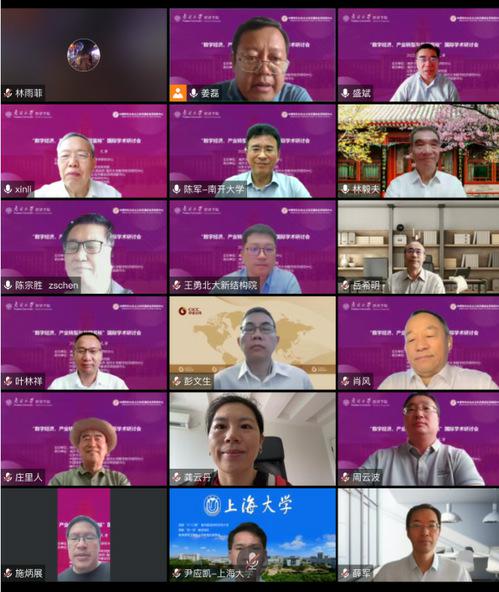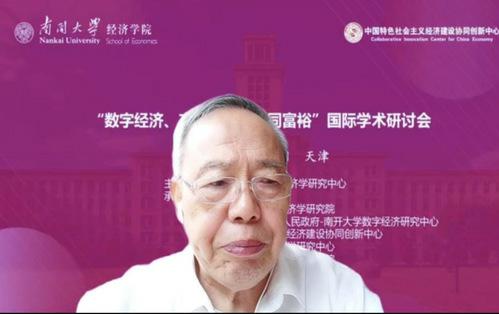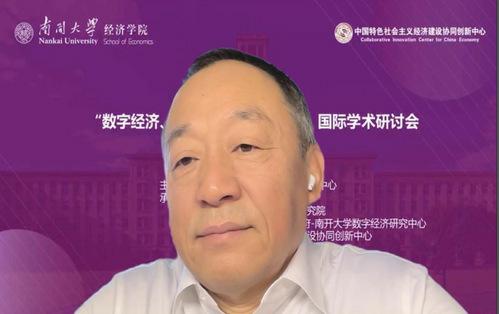International Academic Symposium “Digital Economy, Industry Transformation and Common Prosperity” Held Online at Nankai University
2022-06-16

(Correspondent: Wang Tianjian) On June 11th, the international academic symposium titled “Digital Economy, Industry Transformation and Common Prosperity” was held online at Nankai University. The symposium was hosted by the Research Center for New Structural Economics of Nankai University, and co-organized by the School of Economics of Nankai University, the Institute of New Structural Economics of Peking University, and several research centers and institutes of Nankai University, such as the Research Center for Digital Economy, Research Center for Political Economics, Collaborative Innovation Centre for China Economy, and China Institute of Wealth and Economics. A total of 14 experts and scholars from different universities and institutes including Peking University, Renmin University of China, Nankai University, Nanjing University of Finance and Economics, University of Glasgow (UK), University of Kansas (USA), King’s College London (UK) and Ritsumeikan University (Japan) delivered speeches in the symposium. More than 400 students and teachers attended the symposium.
In the morning, Professor Sheng Bin, Dean of the School of Economics of Nankai University and Director of the Research Center for New Structural Economics, presided over the opening ceremony and the keynote speeches.
Academician Chen Jun, Vice President of Nankai University, attended the opening ceremony and addressed a speech. On behalf of the school, he extended warm welcome and sincere appreciation to the guests. He pointed out that digital economy has become the new driving force for the national economic development and plays an increasingly important role in promoting the high-equality development of economy. Besides, digital economy creates opportunities and unleashes potential for the national economy, and facilitates the process of common prosperity. Therefore, the symposium was of great importance and was held at the right time. Then he praised that the Research Center for New Structural Economics of Nankai University, co-founded by our school and Institute of New Structural Economics of Peking University, is a high-level academic research platform. Since its establishment in May last year, the center has actively participated in various academic activities of the National Alliance for New Structural Economics Research and made a series of remarkable achievements. Academician Chen also expressed his expectations that School of Economics would adhere to Nankai’s discipline of “Know China and Serve China”, discover the road to modernization for the economic development with Chinese characteristics and China’s economics studies, and make further contribution to the construction of first-class university with first-class disciplines.

Professor Lin Yifu, Dean of Institute of New Structural Economics of Peking University, Deputy Director of the Economic Committee of the CPPCC National Committee, delivered his keynote speech titled “Realizing Common Prosperity: the Way of New Structural Economics”. In his speech, Professor Lin summarized the party and the country’s statements on common prosperity and emphasized that common prosperity is the essence of socialism. From the perspective of new structural economics , Professor Lin pointed out that developing in accordance with comparative advantage is an important means for realizing common prosperity, and that the combination of efficient market and effective government is the most crucial institutional arrangement.

Research Fellow Zheng Xinli, former Deputy Director of the Policy Research Office of the Central Committee of CPC, addressed his keynote speech titled “Digital Economy is the Fourth Industrial Revolution of Human Society”, in which he reviewed the four industrial revolutions in human history, and claimed that the combination of digital economy and manufacturing industry would bring earthshaking changes to the development of industries, thus in the future China would have huge potential for development in the field of digital economy.

Nankai’s prominent alumni Peng Wensheng, Chief Economist of China International Capital Corporate Limited, told about the significant influence that the development of digital economy has brought to common prosperity through technical progress. He pointed out that in order to fulfill digital economy’s role in the transformation and upgrading of industrial structure and the realization of common prosperity, we should guarantee the gains of innovators, and at the same time give full play to the spillover effects of scale economy and scope economy to make technical progress a public good. He also stressed that monopoly has currently become one of the most critical problems of the development of digital economy.

Nankai’s prominent alumni Xiao Feng, Deputy Chairman of China Wanxiang Holding Corporate Limited, explained the keys issues and cutting-edge technologies in digital economy, such as blockchain and the Metaverse, from the perspective of an observer and investor of industry. He analyzed the impact of the development of digital technology on the pattern of industrial capital and financial capital, as well as what we should do to create new values in the brand new virtual world, which brings new opportunities and challenges to economic research and the formulation of economic policy.

Professor Chen Zongsheng, former Honorary Dean of China Institute of Wealth and Economics of Nankai University, gave a report on the issue of the difference between urban and rural areas under the theme of common prosperity. By listing 12 typical facts and constructing an index system that covers 6 dimensions, Professor Chen comprehensively presented the achievements that we’ve made and the problems that we currently face in the realization of common prosperity and targeted poverty alleviation. He pointed out that China should put people at first, narrow the gap between urban and rural areas, protect and strengthen the results of poverty alleviation and poverty elimination, and prevent people from falling back into poverty.

In the afternoon, Professor Jiang Dianchun, Vice Dean of the School of Economics of Nankai University, presided over the keynote speeches. Associate Professor Wang Yong, Vice Dean of the Institute of New Structural Economics of Peking University; Professor Ding Sai from University of Glasgow, UK; Professor Yue Ximing from the School of Finance of Renmin University of China; Professor Nakagawa Ryoji from Ritsumeikan University, Japan; Associate Professor Zhang Jianbo from University of Kansas, US; Associate Professor Gong Yundan from King’s College London, UK; Professor Ye Linxiang from Nanjing University of Finance and Economics; Professor Zhou Yunbo, Vice Dean of the School of Economics of Nankai University and Research Fellow Zhao Qiuyun, Director of the Domestic Development Department of the Institute of New Structural Economics of Peking University delivered their keynote speeches.